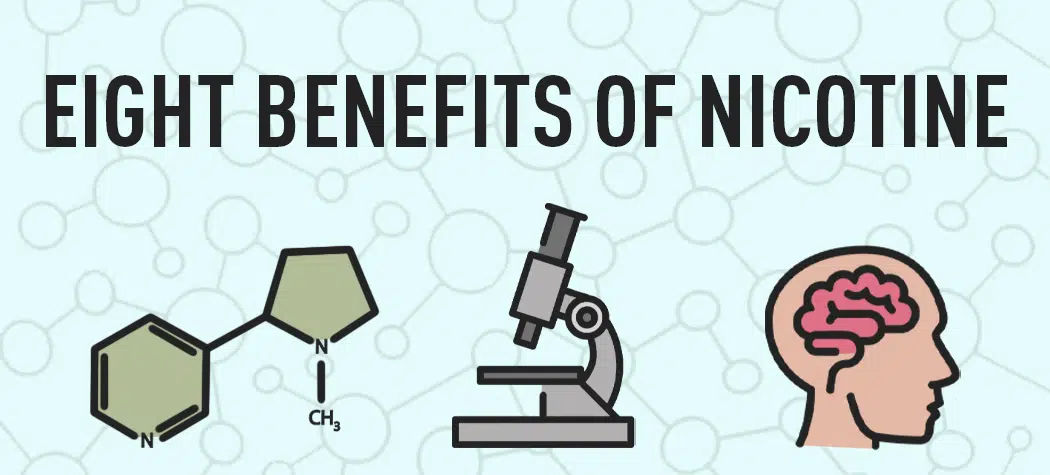Health Studies
8 Real Benefits of Nicotine
Cigarettes and nicotine are interchangeable in the minds of many, mainly thanks to decades of anti-smoking campaigns. The truth is that while people may smoke for the nicotine hit, they die from the tar (Michael Russel, 1976) and other toxins in cigarette smoke. Nicotine itself has been described as a benign and relatively harmless substance and offers users some benefits. Here, we explore eight of these.

Within tobacco, nicotine appears to be a highly addictive chemical compound and most believe is the reason why quitting smoking is so difficult. Action on Smoking and Health says that smoking “is the fastest way of delivering nicotine to the bloodstream.”
But, as Action on Smoking and Health also points out, nicotine replacement products such as patches, inhalers, and gum “have virtually no addictive potential for non-smokers”, because “tobacco smoke may also include chemicals that make nicotine more potent because nicotine separated from tobacco is not particularly addictive.” (ASH Fact Sheets)
So, nicotine doesn’t cause smoking diseases and is as addictive as a cup of coffee (Royal Society for Public health, 2015) – does it actually offer benefits?
1). Improves Long-term Memory
Rusted and Trawley conducted a study that concluded: “Nicotine improves prospective memory when the volunteer has no competing task demands.”
Jennifer Rusted told a Scientific American journalist: “To my knowledge, nicotine is the most reliable cognitive enhancer that we currently have, bizarrely. The cognitive-enhancing effects of nicotine in a normal population are more robust than you get with any other agent.”
2). Improves Short-term Memory
Sherwood, Kerrl, and Hindmarch investigated the effects of nicotine gum on short-term memory. They concluded: “The results suggest that nicotine enhanced memory reaction time performance,” and “it is suggested that nicotine facilitates the processing of stimulus information in short-term memory.”
3). Improves Reaction Time
A University of London study discovered a strong link between nicotine and reaction time, and the result got even stronger when linked to IQ.
More recently, researchers in Taiwan found that “nicotine supplementation enhances simulated game performance”, also stating “nicotine is beneficial to mood, arousal and cognition in humans”.
“Nicotine reduced decision time,” was the finding in a research paper published in Psychopharmacology.
4). Improves Performance
“Within the elite/professional athlete environment use of nicotine is high,” says Massey University’s Toby Mündel in a 2017 study. While British sports coverage tended to focus on smoking, the press went wild when they discovered Leicester’s Jamie Vardy was using a nicotine pouch.
“Players are turning to the moist tobacco in the belief it boosts performance and mental sharpness,” said a national newspaper. Vardy told reporters: “I found they helped me chill out. A lot more footballers use them than people realise, and some even play with them in matches.”
Mündel found the evidence is currently weak to support the claim that nicotine is a performance enhancer, but it is clear many are using nicotine products in the hope it is.
5). Matches Ritalin in Treating ADHD
From multiple studies looking at the performance of nicotine patches and Ritalin, researchers concluded: “These results indicate that nicotine administration has measurable positive effects on cognitive/behavioural inhibition in adolescents with ADHD. The size of the effect is at least comparable to <Ritalin>.”
The lead author commented that this may be why there is a high incidence of smoking in adolescents with ADHD as they self-medicate.
6). Helping with Schizophrenia
A French study reviewed 29 published research papers, concluding: “The findings highlight that a single dose of nicotine can improve a range of cognitive functions in schizophrenia subjects…with attention being the most responsive domain.”
7). Helping with Alzheimer’s
A 2012 double-blind trial found that nicotine could help with early signs of Alzheimer’s. The study concluded that nicotine led to “improvement in primary and secondary cognitive measures of attention, memory, and mental processing”
“We conclude that this initial study provides evidence for nicotine-induced cognitive improvement in subjects.”
8). Helping with Parkinson’s
Nicotine causes dopamine to be produced in the body, giving the user a sense of pleasure. In turn, dopamine reduces involuntary, uncontrolled movement.
Two recent studies highlight how nicotine can help, stating “nicotine suppresses Parkinson’s disease” and “nicotine … partially protects from Parkinson’s disease”.
To conclude, nothing we put into our bodies in abnormal quantities is good for us however, smokers looking to move to vaping can still get the same amounts of nicotine without all the chemicals and smoke inhalation which cause cancer and other lung-related diseases.
Here at E-Liquids UK you can find a wide range of nicotine e-liquids that are fully tested, reliable and will no doubt help you to quit smoking, if you are completely new to vaping then why not start with something small like an Elf Bar 600 Puff that contains 20mg of nicotine (equivalent to 1 pack fo cigarettes) and see how you get on.
Are you Unsure How Much Nicotine You Need?
We’ve put together a great little getting started article to help you discover what strength e-liquids you should be considering.

